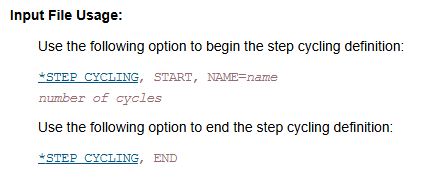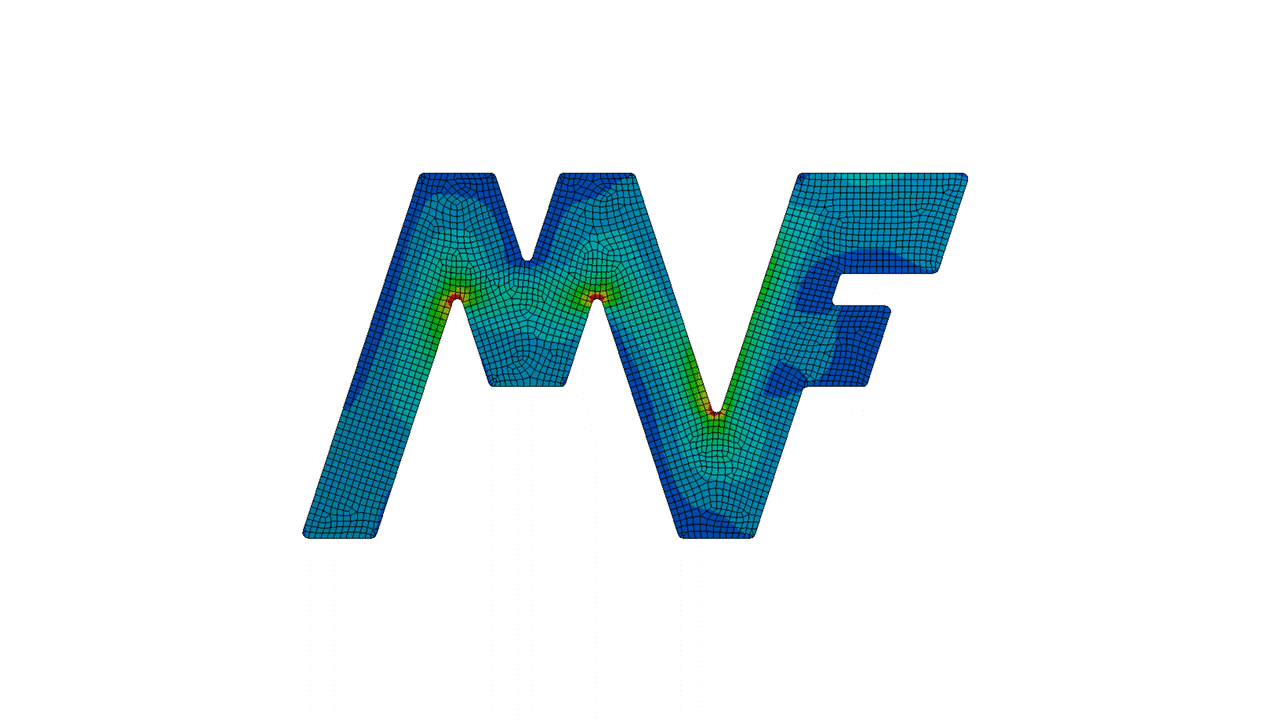Understanding Step Cycling in Abaqus 2025
Introduction to Step Cycling
Step cycling is an essential feature introduced in Abaqus 2025, particularly useful in simulating repetitive loads and boundary conditions over multiple cycles. This tool is a vital component for engineers and researchers working in fields like fatigue analysis, material wear, battery degradation, and thermal cycling. It allows for the efficient management of repeated steps, saving computational resources and improving the accuracy of cyclic simulations. In this blog, we will explore how to define and control cyclic analyses in Abaqus.

Defining a Cyclic Sequence
To start a cyclic analysis in Abaqus, you first need to define a cyclic sequence using the *STEP CYCLING, START option. After that, the number of cycles to be performed must be specified. The sequence is terminated with the *STEP CYCLING, END option. If the end of the sequence is not specified, Abaqus will automatically repeat all steps following the start of the sequence.
Example Code
*STEP CYCLING, START, NAME=my_cyclic_sequence=10
*STEP
...
*LOAD, TYPE=AMPLITUDE
*BOUNDARY
...
*END STEP
*STEP CYCLING, ENDIn this example, the analysis runs 10 cycles, repeating the same set of steps for each cycle. The key point here is that steps defined within the cycling block are automatically repeated. For steps outside the block, the analysis will run them only once.
Controlling and Interrupting a Cyclic Sequence
Abaqus allows you to terminate a cyclic sequence before the specified number of cycles is reached. You can use the *STEP CYCLING CONTROL option for this purpose. This option requires the definition of the cyclic sequence name and setting the ACTION parameter to END CYCLING.
Example Code
*STEP CYCLING CONTROL, NAME=my_sequence, ACTION=END CYCLING
Saving Results in Repeated Steps
By default, Abaqus saves the results for each cycle in a cyclic sequence, but this can lead to large amounts of data. To reduce the size of output files, you can adjust the frequency of saving results:
*STEP CYCLING, START, NAME=my_sequence
10, 2
In this example, Abaqus will save results only after every two cycles.
Splitting Results into Multiple Files
Abaqus also provides the ability to split results into multiple output files. This feature is especially useful for analyses involving a large number of cycles.
Example Code
*STEP CYCLING, START, NAME=my_sequence
10, 2, 5
In this case, Abaqus will automatically divide the results into multiple output databases.
But, Limitations!
While cyclic analyses in Abaqus provide powerful tools for handling repetitive simulations, there are certain limitations and constraints that users should be aware of. These include:
Perturbation Steps: Cyclic steps cannot include perturbation analysis. Perturbation steps involve small changes in the model that can destabilize or alter the results in a non-repetitive manner. Since step cycling is designed to handle repetitive loads or conditions, perturbation steps cannot be integrated into the cycling framework.
Sensitivity and Parametric Analysis: Abaqus also does not allow sensitivity analysis or parametric modeling within cyclic steps. These types of analyses require modifications to model parameters for each step, which is incompatible with the fixed, repetitive nature of cyclic analysis.
Starting from the Last Cycle: When continuing a cyclic analysis, you must restart from the last completed cycle. This is important to ensure the consistency of the simulation across cycles, as intermediate results are crucial to the accuracy of the ongoing analysis.
Conclusion
Cyclic feature is a powerful tool for conducting complex and repetitive simulations. By utilizing this capability, you can easily define repetitive steps and maintain precise control over your analyses. This approach not only saves time but also helps reduce the size of input and output files.
If you are looking to learn more about modeling in Abaqus, you can refer to reputable resources and educational websites. Mastering these capabilities will enable you to conduct more accurate analyses and be more successful in your projects.
For more detailed information, you can refer to the official documentation here.
Online Abaqus Mentoring – Expert Guidance at Your Fingertips
If you’re looking to deepen your knowledge of Abaqus and improve your simulation skills, our Online Abaqus Mentoring service is designed to support you at every step. Whether you’re new to the software or seeking advanced insights, our experienced mentors will guide you through complex simulations, helping you tackle challenging problems with ease.
Our online mentoring includes:
Personalized one-on-one sessions with Abaqus experts.
Assistance with specific challenges in your simulations.
Tips for optimizing your model, improving analysis efficiency, and solving common issues.
Practical solutions for implementing advanced features in Abaqus.
Ready to take your skills to the next level? Visit our Online Abaqus Mentoring Page and register now to start your journey with expert guidance!
Connect with Us on Social Media
Join our online community to stay updated on the latest tips, tutorials, and Abaqus-related news. Follow us for free educational content, tutorials, and exclusive offers to enhance your learning experience.
Follow us on social media:
Don’t miss out on the opportunity to grow your Abaqus skills with BanuMusa! We look forward to connecting with you and supporting your journey in mastering Abaqus.













